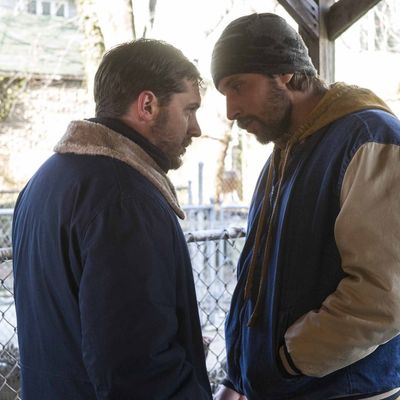
It’s impossible to take your eyes off Tom Hardy, who plays a bartender named Bob in the draggy but atmospheric mob thriller The Drop: You need to watch him every second for clues to the character’s slow, unassertive, yet hyperalert demeanor, to his complicated simpleness. Apart from his thick-slab lips, Hardy is hardly recognizable from role to role. Here, he pitches his voice in a higher register, and, with his Brooklyn stammer, sounds a bit like Jerry Lewis. But in the creepiest way! Bob is a compulsive churchgoer and conflict-averse — he backs away from people, he’s a peacemaker — yet his center is scary-solid. He stays upright even when he’s handling severed limbs or staring into the face of psychotic killers.
Bob works at a Brooklyn bar called Cousin Marv’s, which is run by his actual cousin (James Gandolfini) and occasionally used as a “drop” — a mob depository for illicit transactions. Cousin Marv isn’t a happy publican. A decade ago, he was booted by Chechen gangsters who kept him on as an employee; now he sits in a semi-stupor and stews about the power he has lost while the mild-mannered Bob serves drinks and occasionally handles the drop. One night, two not-so-bright thieves hold up the bar; they’re too late for the drop but get $5,000 that belongs to the Chechens, who are not the sort of men who’ll shrug it off. Bob’s other problem is a dog. He’s busy nursing — along with a neighbor, a visibly damaged nurse named Nadia (Noomi Rapace) — a horribly abused pit-bull puppy he found in a garbage can. You know what kind of film this is when the least threatening creature is a pit bull.
The Drop is another thriller based on the work of Boston native Dennis Lehane, a purveyor of the Higher Pulp: Mystic River; Gone, Baby, Gone; and Shelter Island. This is his first produced screenplay, closely based on his story Animal Rescue, and it’s not very well shaped. (As it happens, The Drop is also the name of Michael Connelly’s last Harry Bosch thriller, and I wouldn’t have wanted to be in the room when Connelly got the news that his title was being ripped off.)
Lehane is clearly taking his cues from the marvelous Boston writer George V. Higgins, whose Cogan’s Trade became the more-than-decent 2012 thriller Killing Them Softly. Higgins found the poetry in his garrulous hoods — he made their winding conversations both scary and hilarious — but Lehane doesn’t have Higgins’s command of dramatic beats, and the shift from Boston (where the story was set) to Brooklyn hurts. Director Michael R. Roskam (who made an excellent Belgian crime drama Bullhead) gives the movie a layered, lived-in texture, but there’s something about the tribalism of Lehane’s Boston Irish Catholic gangster milieu that can’t be replicated.
The film is always losing its rhythm. There’s a psycho named Eric Leeds played by Bullhead star Matthias Schoenaerts who factors in the climax but until then seems almost peripheral, and people keep referring to a character who disappeared — probably bumped off — ten years earlier, which doesn’t give the plot much urgency. The fine stage actor John Ortiz reads his lines like a pale TV hack as a detective, and the part seems extraneous. Plus, every major character wears a beard, which makes them hard to tell apart at first glance — apart, of course, from Hardy and Gandolfini.
As a vehicle for those two actors, The Drop is gangbusters. This was Gandolfini’s last movie role and his second-to-last role, period, if you count an un-shown TV pilot. Watching him in The Drop — like watching Philip Seymour Hoffman in A Most Wanted Man — is heartbreaking. Gandolfini might have never shed Tony Soprano, but as an actor, he was still at his peak. His cousin Marv is a loser with dramatic stature, a Tony Soprano who never happened. His non compos mentis father is draining his income, and he’s grasping at anything — anything — to get a piece of his own back. In the film’s saddest scene, Marv sits in his basement man-cave in an easy chair, all hope visibly drained, and lashes out at Bob for never having fulfilled his promise. He’s projecting — delivering the ultimate judgment on himself.
Lehane always works some sort of higher message into his pulp material, and in The Drop, it’s more of his grim fatalism. There are hoods like Bob who’ve learned to take the most emasculating events as they come and bide their time, and hoods who try to change things fast — in most cases, stupidly, shortsightedly — and end up lying in pools of their own blood. Most thriller writers don’t aim so high: You really have to grapple with Lehane’s vision to see how tiresome it is.


